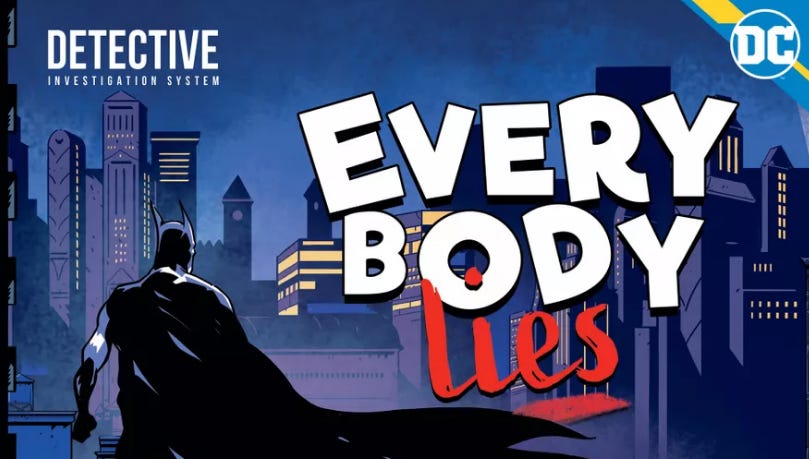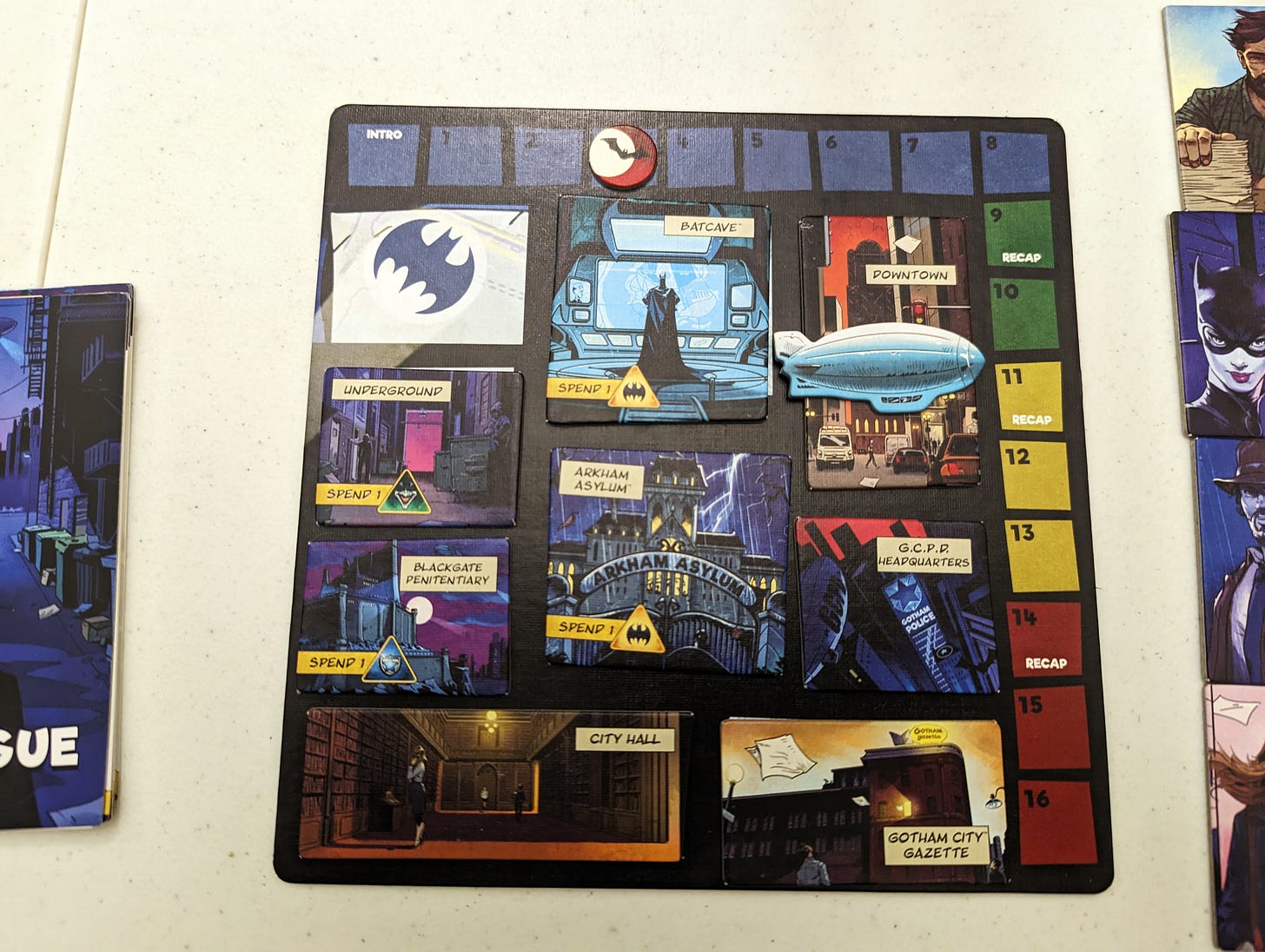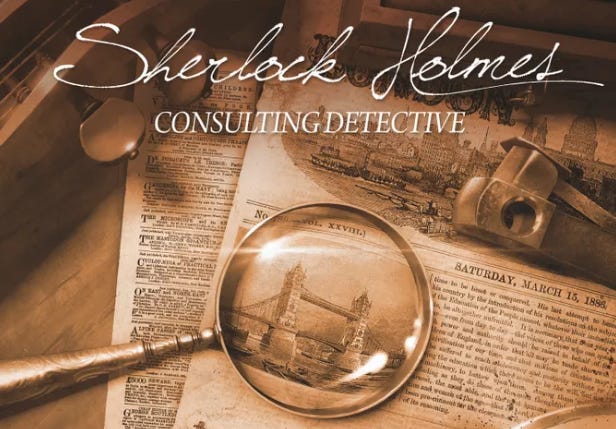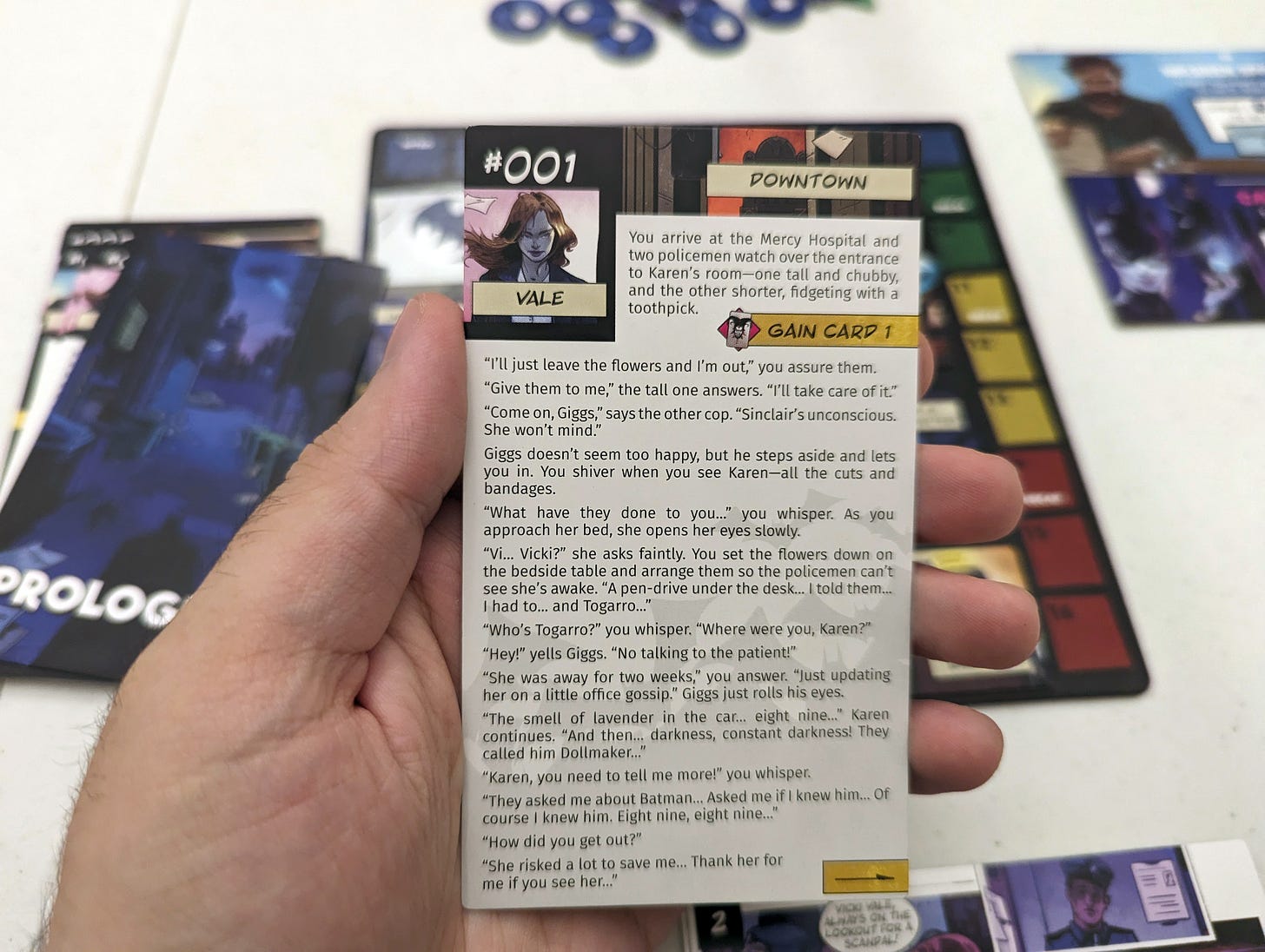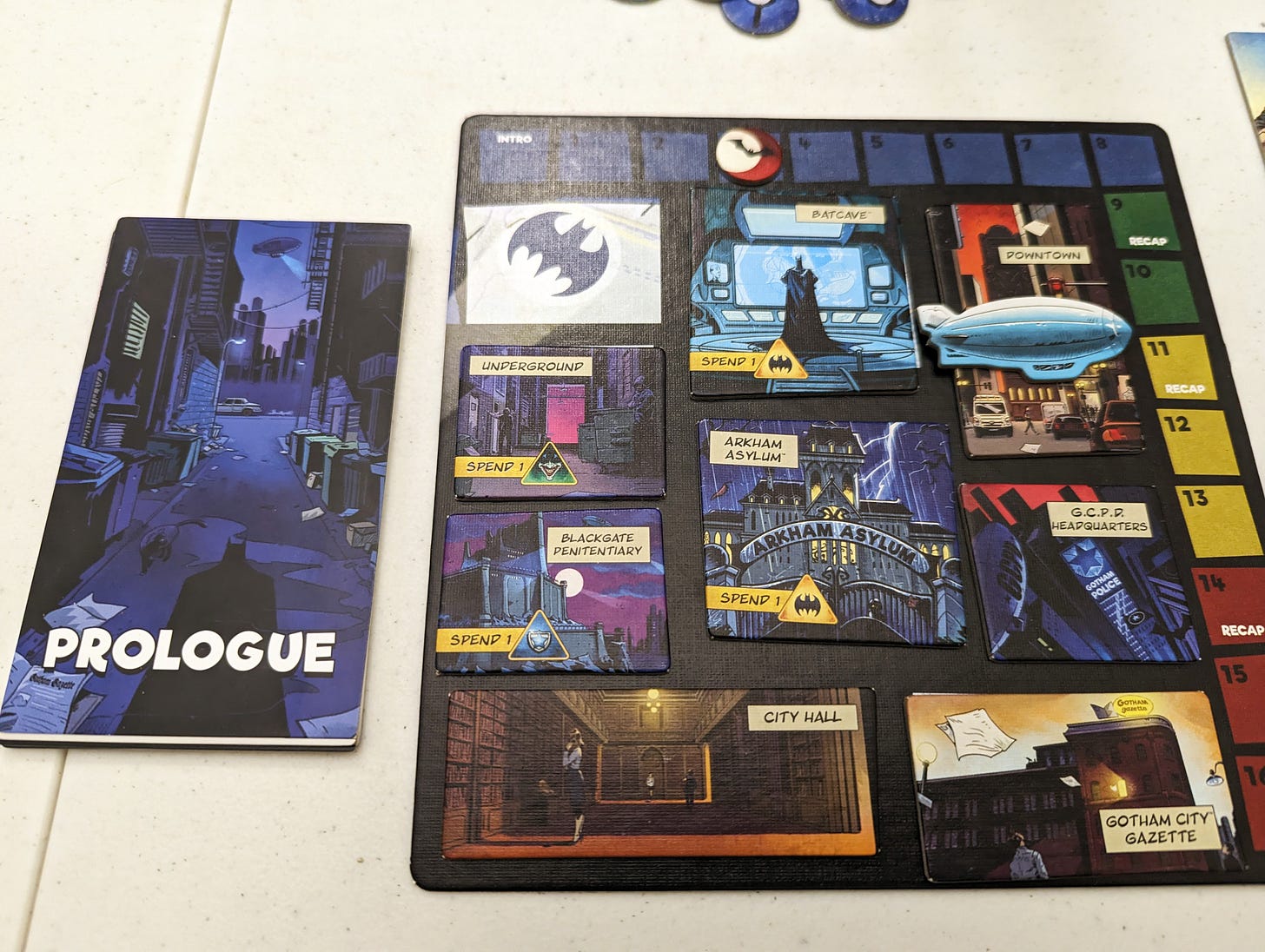Sometime last year, Roll For Crit host Will lent me two Batman board games that can (or must be) played solo: Batman: Everybody Lies and Batman: The Dark Knight Returns - The Game. Both games had been sitting on my table for all that time, dusty and unloved until a couple of weeks ago. While Will was away at Gen Con, our game nights were on pause, so I took advantage of the opportunity to finally play through the two Batman titles and get them off my table for good. (This was especially welcome because The Dark Knight Returns has a really big box.)
Both games I think are interesting case studies in how to successfully (or unsuccessfully) adapt a licensed property to a tabletop game. In Part 1 of my newsletter, I’ll be sharing my thoughts on the one I liked the least, and that’s Batman: Everybody Lies.
Everybody Lies is a narrative mystery game in Portal Games’ “Detective” line. This series began with Detective: A Modern Crime Board Game, and has since moved into the world of licenses, first with Dune, and now with Batman. I was a pretty big fan of the original Detective game, which did a few things quite well. The system itself was pretty novel at the time of release, feeling like the crescendo in a wave of narrative board games.
In every Detective game, you choose various locations to travel to in pursuit of answers to a mystery. Once you arrive, you receive a card which details exactly what happens there and what clues you discover. Most cards also include new leads, which inform you where you can travel to next and what you might expect to find there. It’s up to you to decide which leads are worth pursuing, and which are just red herrings.
The other big innovation in Detective was the use of a web site, which was required to complete each case. This provided the “modern” part of the Modern Crime Board Game title. Here you could input evidence such as fingerprints, analyze clues, and answer questions about the case once you felt you’d found enough information to solve it. All together, Detective felt like a refreshing to navigate a mystery, and the promise of more exciting developments to come.
I’m sorry to say that I think that ship has run its course, and Batman: Everybody Lies is a great example of how not to take advantage of a promising system. On paper the concept sounds like a match made in heaven - Batman is known as the world’s greatest detective. He’s essentially just Sherlock Holmes in a cape and cowl. We’ve had plenty of opportunities to explore his combat skills, but his analytical mind isn’t always explored to its fullest extent in adaptations.
Unfortunately, you don’t get to play as Batman in Everybody Lies, even though he gets first billing and is the only character on the cover art. This is a huge wasted opportunity, and one of many decisions made in this game’s design that I just can’t understand. Again, Batman is literally referred to as the world’s greatest detective. He first appeared in DETECTIVE COMICS. This is a series called Detective. How did this happen??
Okay, okay, for comparison’s sake, let’s look at another mystery tabletop game, the Sherlock Holmes: Consulting Detective series. This is an excellent game series which notably does not let players play as Sherlock himself. So, why does that not bother me while this one does? I think the difference is that Sherlock Holmes, for all his skills and renown, is just a man at the end of the day. The only thing that really separates him from other people is his absurd capability for deduction and reasoning. Therefore, the only way that Consulting Detective could make you feel like you were embodying Sherlock would be to feed you game breaking clues that his brilliant mind would uncover naturally, much faster than you or I could. This of course would remove the fun from the game, because you wouldn’t be solving the mystery for yourself. Playing as him wouldn’t necessarily add anything to the gameplay, and in fact, would actively detract from it.
Batman on the other hand is not just a man. He is, in point of fact, a bat man. He has a lot more going for him than just his brilliant mind. He has a Batmobile. He has Batarangs. He has a Batcave. He has fascinating tools at his disposal that would be a lot of fun to play with as a detective in Gotham! He even has a super computer which could be used to analyze data! This is an A to B connection from Batman to the Detective board games that’s so obvious it’s impossible to miss, and yet somehow Everybody Lies missed it. The web site integration in Everybody Lies is far, far less interesting than in earlier entries, as most, if not all of its content could have easily been replicated on paper and card stock. The need to use a phone or computer while playing is redundant at best, clunky and distracting at worst.
Another point that separates Batman from Sherlock Holmes is his well developed relationship to the people and places of Gotham. Holmes tends to solve standalone cases with little or no personal connection to himself, but Batman mysteries are usually full of personal connections. He has history with every single villain, ties to issues through his Bruce Wayne identity, and even his own Bat family in the form of Robin, Batgirl, and the rest. None of those aspects come into play at all in Everybody Lies. You can consult Batman at his Batcave, and later on he shows up a few times to ask for your help, but outside of that, don’t expect to see too much of the Caped Crusader.
Perhaps the game would’ve set more realistic expectations if it were called “Gotham Mysteries” or something, because who you actually play as are four characters who are decidedly less cool than Batman - Reporters Vicki Vale and Warren Spacey, police detective Harvey Bullock, and anti-hero Catwoman. Regardless of how little sense it makes for these four to be working together, it’s hard for me to grasp most of these choices. For crying out loud, they don’t even let you play as Commissioner Gordon, one of the most celebrated comics characters of all time, and a seemingly obvious choice for street level mysteries in Gotham.
Catwoman is an iconic character, but she’s decidedly less interesting when she’s being forced into the role of team player for the good of the city with little rhyme or reason. Bullock is great too, but none of his trademark cynicism or corrupt leanings come into play here. For all intents and purposes, he might as well just be a generic Gotham cop. There’s hardly any flavor at all, and that holds true for Vicki and Warren as well.
Lack of flavor is a pervasive problem throughout Everybody Lies, as the fact that we’re in Gotham City, home of The Bat and about 1,000 lunatic villains rarely feels significant. There are a handful of cameo appearances from villains like Penguin and Croc, but they’re almost all side characters with ancillary ties to what’s really going on. I imagine this was done because the writers wanted to avoid any conflicts with the canon (who cares?!) or perhaps because they just wanted to show a different side of Gotham that hasn’t been over-explored yet.
As a result though, you’ll spend most of your time in the game visiting the headquarters of Gotham’s newspaper, or attempting to interview cops at the precinct (I yawned just writing that sentence). When you do occasionally get to visit Arkham Asylum to interview a patient, you’re rewarded with some more dry dialogue, and clues that only lead back to the less-than-riveting tale of a senator and her war on drugs. If you’re lucky, the Joker might get wheeled by in a straitjacket and shout a shockingly unfunny quip as he goes. It’s dull.
Almost as baffling as the thematic choices in Everybody Lies are the gameplay choices. In order to access certain locations, you’ll need to spend special tokens. For example, visiting the Batcave requires a Batman token. You can’t actually get Batman tokens in the normal course of play though. Instead, you’ll need to trade in two regular tokens to receive one special token of your choice. In theory, this should elevate those locations and make them seem more desirable to visit. In practice, it means that when you want to visit the Batcave, you must first put two tokens in a pile, then retrieve a third token, then immediately place that third token back in the pile. If you’re like me, you’ll quickly realize this is a waste of time, and for the rest of the game treat everything that requires a special token as simply reading “this requires two regular tokens”.
This token thing might read like nitpicking, but it’s indicative of the larger problem with the game as I see it: nobody actually put much thought into how it plays. Sure, it sounds like a good idea to have a second tier of token, but they don’t actually matter at all. It’s just a layer on top of another layer that obfuscates how much nothing there is underneath. In no way is it additive, nor does it provide any measure of “fun”.
The same goes for the game’s character goals and scene cards. Scene cards are comic book style illustrations depicting the start of a scene at a new location. Again, in theory, this works by adding a bit of comic book flair to the game and further immersing players in the world. In practice, it’s just more nothing. The scenes aren’t particularly well drawn, and they almost never provide any worthwhile information or context - 90% of them are simply recreated from the text that already exists on the other cards.
Character goals are “secret” objectives that each character has, usually relating to a specific aspect of the case that they’re personally interested in pursuing. If playing the game with multiple players, you have the option of disclosing these goals or keeping them to yourself, but make no mistake, they don’t really have an impact on gameplay. No one is a traitor, no one really wants anything that’s strictly bad for the team. In the majority of cases they simply want to find information that everyone else probably wants to find out anyway. Technically speaking, Everybody Lies isn’t even meant to be played solo because of these character goals, but it was supremely easy to incorporate them as a single player without feeling like I was missing out on anything at all. Just another mechanic that sounds like something on paper, but is just more needless fluff to convince players that there’s anything new here at all.
Batman: Everybody Lies isn’t actually that terrible of a game. It’s competent. The prose is dry, but the mystery itself is at least compelling enough to get you to play through it all (altogether, probably a 6-8 hour experience) to discover the ending. Or maybe I’m just being overly generous because I find it hard to stop myself from finishing a mystery once I’ve started it. In a few weeks, I’m fairly confident that I won’t remember any details of the cases or the shocking twists contained therein. The story is enough to keep you moving while you’re playing, but it’s nothing with any staying power.
More than anything, Everybody Lies is a missed opportunity. The writing isn’t good enough to stand on its own, and the Batman theme doesn’t come through strongly enough to make it worthwhile for any but the most hardcore of fans. Frankly, I’ve been disappointed with every Detective entry since the original (Dune was even less engaging than Batman), and I think it’s time for them to really step things up or put this series out to pasture.
Next time in Part 2, I’ll discuss a game I actually liked!




